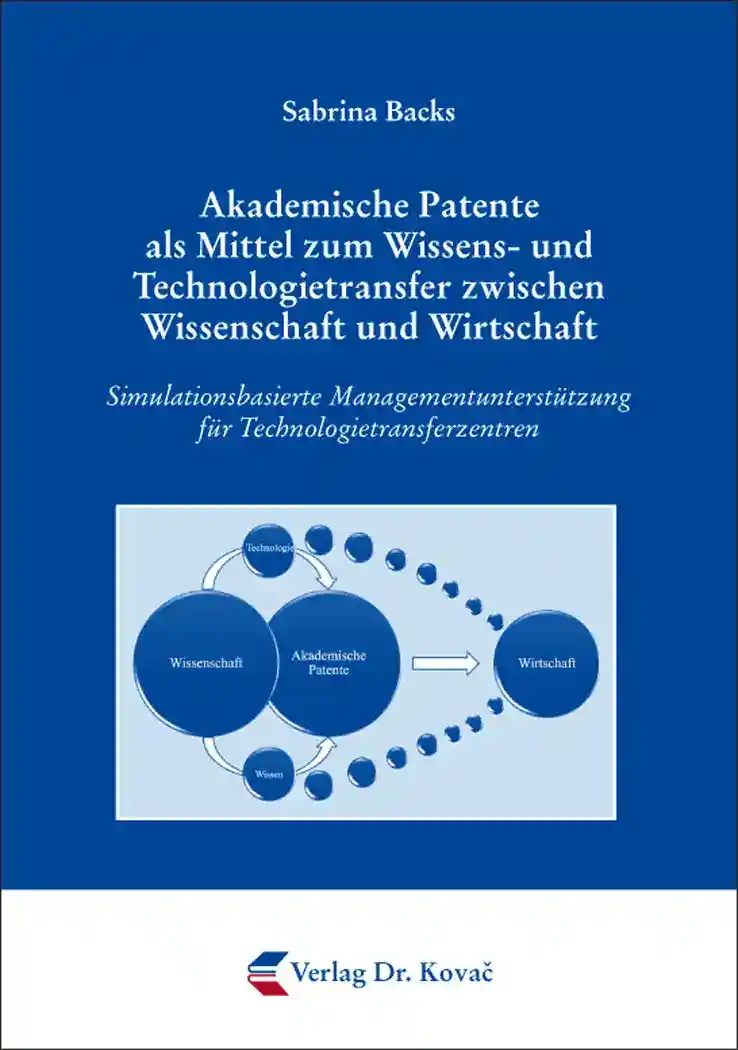Sabrina BacksAkademische Patente als Mittel zum Wissens- und Technologietransfer zwischen Wissenschaft und Wirtschaft
Simulationsbasierte Managementunterstützung für Technologietransferzentren
Schriftenreihe innovative betriebswirtschaftliche Forschung und Praxis, volume 459
Hamburg 2016, 282 pages
ISBN 978-3-8300-9190-5 (print) |ISBN 978-3-339-09190-1 (eBook)
About this book deutschenglish
Given the increasing relevance of intellectual property rights as well as the abolition of the professors' privilege in many countries, universities are becoming more interested in filing the inventions of their scientists as academic patents. This development not only bears various potential implications for research and teaching, but also raises new challenges for the universities' administration and management. As a consequence, most universities in Germany have set up technology transfer offices (TTO) that (also) act as service centers for the university's scientists. In a subsequent step it becomes essential to communicate the service offerings within the respective university (e.g., by means of information events) and to equip these TTOs with a toolbox of measures (e.g., incentives to be offered to academic inventors) in order to foster and establish the transfer of knowledge and technology (also) by means of academic patents.
In this context, the research contribution of this dissertation is threefold:
An in-depth literature survey provides an overview of the state-of-the-art of management research in the field of academic patenting. It is concerned with implications for research, teaching, and management at universities, and discusses both complementarities and discrepancies of prior works with respect to dealing with academic patents and their possible impact. A particular focus is set on academic inventors since they obviously are the source for potential academic patents. Consequently, it is necessary to gain deeper insight in the motivation (and corresponding stimuli) of scientists who have made an invention and are about to decide whether to file it as a patent (and publish results later or never) or to publish their findings immediately (and to waive the opportunity to file them in a patent).
Existing incentive schemes have then been investigated at several universities in Austria. This study has been performed in the course of the European Science Foundation (ESF) research project APE-INV (The reason for carrying out this investigation for Austrian universities is that Prof. Dr. Christian Stummer, the supervisor of this thesis, has participated in this project.). It has consisted of two online surveys as well as a couple of personal interviews that have shed light on intrinsic and extrinsic motivations of researchers, the perceived benefits they might gain from various incentives and the perceived effectiveness of several types of information events.
Based on these data as well as on additional insights from an empirical study at Bielefeld University a computer simulation was developed that may be used for providing decision support for managers at a university's TTO (or at the university level) when composing a portfolios of measures out of (alternative) incentive schemes and information events. The simulation allows for testing the effectiveness of such a portfolio in a virtual setting before its measures are implemented in reality. Decision makers thus can find the “best” portfolio with the most appropriate measures for furthering knowledge and technology transfer between science and industry.
Keywords
Agentenbasierte SimulationAkademische PatenteDritte Mission von UniversitätenEntscheidungsunterstützungManagementPatentanmeldungTechnologietransferzentrenWirtschaftWissens- & TechnologietransferWissenschaftIhr Werk im Verlag Dr. Kovač

Möchten Sie Ihre wissenschaftliche Arbeit publizieren? Erfahren Sie mehr über unsere günstigen Konditionen und unseren Service für Autorinnen und Autoren.
